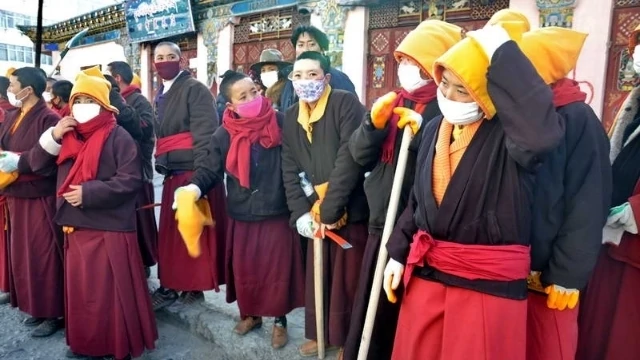Just like Muslim women in Xinjiang, lay Buddhist girls and nuns are also submitted to systematic rape in Tibet’s transformation through education camps.
by Massimo Introvigne

After the February 2 BBC report, which shocked the world and lead to several governments and Parliaments condemning Chinese atrocities, it is now widely known that in Xinjiang’s dreaded transformation through education camps Uyghur and other Turkic women are systematically raped. These are not occasional abuses. A “rape culture” is promoted to break the women’s ethnic and religious identity, and their will. Based on testimonies of ethnic Kazakhs who escaped Xinjiang to Kazakhstan, Bitter Winter reported that male inmates, particularly the younger boys, are also victims of the “rape culture” in the transformation through education camps.
These camps, with the same name mentioning “transformation through education,” exist also in Tibet. Some of Bitter Winter Tibetan correspondents reacted to the BBC revelations telling us that the stories of the Uyghur and ethnic Kazakh women rang a familiar bell. The same happens in Tibetan camps. Bitter Winter was told that cattle prods are used there to control and torture inmates, and it is common that they are used to rape women by inserting them in their private parts. One of our informants commented that this routinely happens to nuns, who are told that their bodies “belong to the CCP” rather than to the monasteries. There is a political reason for this. Once raped, a nun will difficultly be taken back by her monastery, and should settle for a secular life.
In 2018, the Tibetan Centre for Human Rights and Democracy had published and translated an exceptional report by a monk who had spent time in a transformation through education camp in Sog (Ch: Suo) County, Nagchu Prefecture, in the so-called Tibetan Autonomous Region. He told the story of how, when arriving at the camp, nuns were compelled to undress in front of the guards before receiving military uniforms. They were then subjected to demanding military drills. “Many nuns, the monk wrote, would lose consciousness during the [military] drills. Sometimes officers would take unconscious nuns inside, where I saw them fondle the nuns’ breasts and grope all over their body.” He also heard of “some officers lying in the nuns’ bedroom pressing unconscious nuns underneath.”
The BBC’s revelations also prompted the Taiwan Times to publish a series of testimonies of torture and sexual abuse of women in Tibetan jails and detention camps. The two articles, the second a comment on the fate of the nuns of the two large centers of monastic studies at Serta Larung Gar and Yachen Gar, generated considerable attention and political reactions in Taiwan, but were not particularly noticed abroad.
One story concerned Rinzen Kunsang, a Tibetan woman who was arrested for taking part in a demonstration. “We were handcuffed and stripped, she reported. Two women beat us with bamboo sticks and prodded us with electric batons… Then they beat me with a stick. They hit so hard and so many times that the sticks frequently broke.”
Other Tibetan women were hung from trees in straitjackets (the “airplane” torture), and hit with electric batons. “Ngawang Tsepak, a nun, was taken down only after both her shoulders had become dislocated,” the Taiwan Times reported.
The women are also starved with substandard meals, and many die. Adhi, a married woman, told the Taiwan Times that she survived because she was selected to feed the pigs, and was able to steal some of the pig food and eat it. She had to pay for this privilege through special “sexual favors” requested by the Han Chinese bureaucrats overseeing the jail. But it was worth it, Adhi said. Out of the 100 Tibetan women in her group, 96 died in jail, and only four survived: the four who had been selected to feed the pigs.
Ngawang Jhampa, a nun, reported that she “was beaten with chairs, sticks, and electric cattle prods. The latter were placed in my mouth and twisted around. When placed inside the mouth, they draw blood and rapidly deteriorate the body.”
Gyaltsen Chodon, a 23-year-old nun, said that the Chinese guards “would tread on our hands with their huge iron-tipped boots, kick us in the face and stomach. They put buckets of urine and feces on our heads and guards hit the buckets with sticks, roaring with laughter as the excrement streamed down our face and bodies.” Ngawang was “tied with an electric cord, beaten with cattle prods, and had dogs attack her many times.” For her, “the worst problem was the electric cords tied around her breasts. When the electricity was applied, it made her feel like she was going to die.”
Nima Tsamchoe, was arrested at 19 after she took part in a protest. Now living in India, she told the Taiwan Times that, “Dogs were set on us while we were naked. Lit cigarette butts were stubbed on our faces, knitting needles jabbed in our mouths.” The Tibetan prisoners were “kicked in the breasts and in the genitals until they were bleeding,” “made to hang from trees and beaten on bare flesh by electric batons. Containers of human urine were poured over heads.” Then, they were raped. Nima was first “hung up from the wall with my legs up and beaten with electronic rods in the genitals and in the mouth,” then abused by the guards.
All nuns were raped, the Taiwan Times reported, first with cattle prods and then coerced to sleep with the guards. The “rape culture” the BBC found in Xinjiang is a daily, horrific culture in Tibet too.
Source: Bitter Winter












